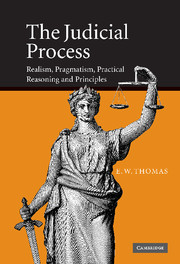Book contents
- Frontmatter
- Contents
- Preface
- 1 Introduction
- 2 Muddling along
- 3 The ‘curse’ of formalism
- 4 Legal fundamentalism
- 5 The idolatry of certainty
- 6 The piety of precedent
- 7 The foibles of precedent – a case study
- 8 There is no impersonal law
- 9 So, what is the law?
- 10 The constraints on the judiciary
- 11 Towards a new judicial methodology
- 12 Of realism and pragmatism
- 13 Of … practical reasoning and principles
- 14 Taking law seriously
- 15 A theory of ameliorative justice
- Subject index
- Authors index
5 - The idolatry of certainty
Published online by Cambridge University Press: 15 July 2009
- Frontmatter
- Contents
- Preface
- 1 Introduction
- 2 Muddling along
- 3 The ‘curse’ of formalism
- 4 Legal fundamentalism
- 5 The idolatry of certainty
- 6 The piety of precedent
- 7 The foibles of precedent – a case study
- 8 There is no impersonal law
- 9 So, what is the law?
- 10 The constraints on the judiciary
- 11 Towards a new judicial methodology
- 12 Of realism and pragmatism
- 13 Of … practical reasoning and principles
- 14 Taking law seriously
- 15 A theory of ameliorative justice
- Subject index
- Authors index
Summary
A conversation in chambers
(The scene is the Judge's chambers. His two judge's clerks enter. Warm morning greetings are exchanged. The first judge's clerk waxes enthusiastically about a film that he saw the night before. The second judge's clerk is more interested in reviewing a book that she is finding fascinating. The judge interrupts …)
Judge
Well, I am finding the appeal we are to hear on Monday fascinating. It is conceded that the solicitor's advice to the husband relating to a property investment was hopelessly negligent. But the husband didn't act on it; he made the solicitor's report available to his wife and she made the investment – to her cost. Everyman J at first instance has held that she cannot recover against the solicitor.
1st judge's clerk
It's relevant, Judge, that the solicitor had previously given both the husband and wife investment advice and knew that they invested in properties both jointly and separately. But he hadn't seen the wife for about two years and was undoubtedly acting for the husband on this occasion.
Judge
Yes, but let's sort out the law first before we look at the facts in more detail
2nd judge's clerk
That's not like you Judge. What did you have for breakfast?
Judge
(Ignoring the sally) I am aware that in negligent misstatement cases the courts have attempted to create a degree of certainty in the ambit of the duty and to counter the danger of indeterminate liability – so, I expect the worse!
[…]
- Type
- Chapter
- Information
- The Judicial ProcessRealism, Pragmatism, Practical Reasoning and Principles, pp. 108 - 138Publisher: Cambridge University PressPrint publication year: 2005

